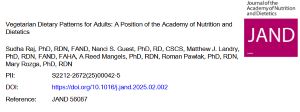The Academy of Nutrition and Dietetics Publishes a Position Paper on Vegetarian Dietary Patterns for Adults
by Reed Mangels, PhD, RD
The Academy of Nutrition and Dietetics (AND), the world’s largest organization of food and nutrition professionals, recently published a position paper about vegetarian dietary patterns for adults. According to AND, “a position paper is a critical analysis of current facts, data and research literature on a specific issue with high, or at least moderate, quality evidence.” Position papers from AND are based on systematic reviews of the research literature. I was one of a team of people who developed and authored this position paper.
The position paper begins with a paragraph summarizing AND’s position. Here’s what it says:
It is the position of the Academy of Nutrition and Dietetics that, in adults, appropriately planned vegetarian and vegan dietary patterns can be nutritionally adequate and can offer long-term health benefits such as improving several health outcomes associated with cardiometabolic diseases. Vegetarian dietary patterns exclude meat, poultry, and seafood, and vegan dietary patterns exclude all foods of animal origin. Registered dietitian nutritionists (RDNs) and nutrition and dietetics technicians, registered (NDTRs) play a pivotal role in providing meal-planning strategies and evidence-based nutrition information to clients currently following vegetarian or vegan dietary patterns or who may benefit from and express interest in following vegetarian or vegan dietary patterns. RDNs and NDTRs can work with their clients to create tailored, lifestyle-oriented, nutritionally balanced, and culturally suitable vegetarian and vegan dietary patterns that optimize health benefits while reducing concerns about nutrient inadequacies. This position was approved in January 2025 and will remain in effect until December 31, 2032.
The paper goes on to provide information about the role of vegetarian, including vegan, diets in the prevention and management of chronic diseases, key nutrients for vegetarians, and vegetarian diets for older adults and for those with food insecurity. It includes recommendations for dietitians who work with vegetarians and vegans and with clients who are interested in or who could benefit from these diets. The paper says that AND “will advocate for policies and legislation that support equitable access to more plant-based foods in a variety of settings (e.g., schools, childcare nutrition programs, federal assistance programs) and within clinical care to meet the cultural, customary eating pattern, religious, and sustainability preferences of individuals.”
Information from VRG’s poll of the number of vegetarian adults is included in the paper and several of VRG’s resources, such as My Vegan Plate and Vegan Diets in a Nutshell are listed as helpful resources for practitioners.
The complete position paper is available at https://www.jandonline.org/article/S2212-2672(25)00042-5/pdf
Raj S, Guest NS, Landry MJ, Mangels AR, Pawlak R, Rozga M. Vegetarian Dietary Patterns for Adults: A Position of the Academy of Nutrition and Dietetics. J Acad Nutr Diet. Published online February 7, 2025. doi:10.1016/j.jand.2025.02.002

